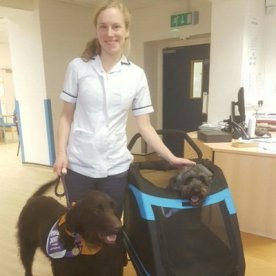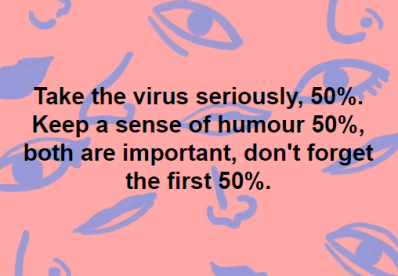16/03/20
MY CASE
I’m 37, fit and healthy, working in the NHS as a physiotherapist, and in the second trimester of my first pregnancy.
Five weeks after the first confirmed case of the new Coronavirus SARS-CoV-2 in the UK, I was confirmed positive as the first (I was told, but if not one of the first) pregnant confirmed cases in the UK, at eighteen weeks pregnant. There were only 270-something confirmed cases in the UK at this point; with my diagnosis and one other on the same day, the number of confirmed cases in Essex went from one to three, out of a population of 1 1/2 million!
I had felt slightly unwell and taken three days sick leave. This was eight to nine days after my fiancé came back from Italy, which was my first link to some sort of traceability so it became the start of the story (but it has become clear that working in London with two and a half hours commuting a day equally if not more so, exposed me to infection risk). Because the coronavirus was still just -something happening on the news elsewhere in the world- I was certain it was the relentless office lurgy. I had a headache, stuffy nose, tiredness and general malaise, but I was back at work after that. He had symptoms six days after mine started, slightly feverish and chesty and a mild headache, and purely because of his travel history we rang 111. Things really kicked off because this was in ‘Phase One – Containment’ of the UK Government’s response plan (‘prevent the disease taking hold in this country for as long as is reasonably possible’) we were treated very differently from the new cases occurring in ‘Phase Two – Delay’. We were told to drive to A&E and sit outside with our hazard awareness lights on and stay in the car, where a fully suited nurse posted nasal swabs through the car window and sent us home to self-isolate. I was confirmed positive three days later. He needed re-testing and got his positive result in two days (they soon started providing results in twenty-four hours, they were getting quicker). We asked for the retest because we felt the self-swabbing had not been done correctly in his case! (this was escalated and staff started taking all the swabs).
We were put in self-isolation for fourteen days, completely separate from each other due to concerns over a chance of reinfection and the virus potentially being passed back and forth between us. Public Health England representatives called us frequently until we could relay to them a firm plan they were happy with; this involved testing my brother, who had spent just twelve hours with us in distant contact, and then getting him out of the house to self-isolate elsewhere for fourteen days. They took the names and telephone numbers of everyone we had contact with whilst symptomatic and called my workplace. All this is now out of date protocol. Information is changing rapidly. The ‘Delay’ phase came in on 12th March, this is when Patrick Vallance, the Government’s Chief Scientific Advisor, said the number of cases was likely between five to ten thousand, many more than the official stats showed, and tactics changed. People with symptoms and confirmed cases at the time of writing are told not to call 111, to stay at home for seven days, and are not being tested.
Separate self-isolation under one roof meant having no contact, cleaning everything shared, food left behind closed doors, getting as much fresh air and sunlight as possible via windows, exercising in a small space, and resting and recovering on your own. I was in the bedroom and my partner in the living room. We both felt unwell for about a week and under the weather for another week, no major symptoms but not feeling 100% so unable to concentrate on working from home. I was called daily by a senior midwife who reassured me and gave me updates, and from Public Health England and ‘NHS Well-being’ (never heard of them before). Most of our time was spent discussing the rapidly changing advice with these authorities, family, friends and work colleagues to make informed decisions whilst in turn helping the authorities inform their knowledge to learn more about the disease from the point of view of those going through it, particularly as a pregnant woman.
I couldn’t believe we were having the ‘worst public health crisis for a generation’ unravelling in my first pregnancy when every day you already wonder if everything is going smoothly! But after the initial scare it turns out the biggest impact will be on my job in healthcare, which could change in any capacity as the NHS is put under more pressure. I had very mild symptoms and am young and healthy therefore very low priority. I’m looking forward to getting back to work to help others who are higher risk and worse affected and support the health service. Also to helping inform the pathway for pregnant women with Covid-19.
KEY MESSAGES
Follow the public health advice: From my personal experience Covid-19 symptoms can be very mild or non-existent if you are fit and healthy and may vary from the most commonly reported symptoms, if you don’t have strong symptoms you could still spread it and put others at risk. Follow the public health advice on preventing the spread of infection diligently and take it seriously.
Being one of the first exposed I hadn’t fully grasped the risk of community transmission, now I do. There was an unusually high level of office sickness that had started to baffle me, but I was blaming it on the strong NHS work mentality to keep going unless unable to mentally and physically do so. My partner had only been in Milan for just a few hours on his own. We presumed he’d had a near escape. I was at work for two days after my symptoms subsided. We had let my brother visit us while we were awaiting test results, he’d come all the way from Sweden to visit. In summary – there was no common knowledge of the incubation period and asymptomatic / ‘silent’ spread of Covid-19.
The first relevant news report I read said ‘One of the new confirmed cases of Covid-19 is in Essex, the resident had no relevant travel and it is not yet clear whether they contracted it directly or indirectly from an individual who had recently returned from abroad; investigations are ongoing.’ It was in Colchester, a train I take from London Liverpool Street on my commute. Who knows, I could well have infected this person. It is now impossible to trace because of rampant community transmission.
Prepare: Take care of yourself NOW, eat well and exercise while you can, keep informed so you can weigh up the information and make the best decisions, and liaise with work and think about your finances. (*Note, I wrote this before the chancellors budget was announced on 11th March and before the UK lock down came into force on 23rd March, but it remains relevant).
Pregnant women: The best resource for pregnant women is: https://www.rcog.org.uk/en/guidelines-research-services/guidelines/coronavirus-pregnancy/covid-19-virus-infection-and-pregnancy/
Support each other: This is a world of uncertainty and constant decision making due to rapidly developing information and advice; getting complacent with the plan and then in an instant getting a new urgent instruction. Being amongst the first diagnosed we faced mixed reactions, from fear and panic to blame. Unlike mine, my partners’ workplace was neither understanding nor supportive and not yet set up for advice on financial help. Because of this we had to spend a lot of time whilst we were already feeling worried and recovering from being ill explaining to others and directing them to do their own reading to get better informed.
The positives
Because of the containment approach we had excellent support, we have both been tested and know we had the virus.
There was no panic buying, the shops were fully stocked, delivery services were all running smoothly!
The negatives
Facing negative initial reactions and mixed advice.
Having to spend the majority of our time weighing up and communicating rapidly changing information with people – Public Health England, clinicians, friends, family, and work due to this all being new.
Longer self-isolation downsides (like less exercise and fresh air) we were in isolation for fourteen and twenty-one days respectively (my partner longer because of his employer developing their return to work guidelines).
Being further along in the illness means the research is always lagging behind, for example we don’t have the facts on immunity, re-infection, risk of a ‘second wave’ of the virus, and we still don’t know how it might affect pregnancy (at the time of writing).
Now we may be the safest people to be around!!!


Hi Sophie, I did just try to leave a comment but I can’t see it so, sorry if this comes through twice! Just wanted to say big thanks for writing this blog and sharing your story. I’m in second trimester and so worried and this helped alot.
I am also a freelance journalist and wondered if you might be interested in speaking to me as it would be great to get your message out there to more women. There’s so much doom, gloom and fear, we need more stories like this. Thanks!
LikeLike
Hi, thanks for messaging, a little bit of communication is going a long way right now. I’ll message you!
LikeLike
thanks for sharing this, I’m a steward in an acute trust and pregnant women are understandably anxious. I think this maybe reassuring for them to read.
LikeLike
Update 20/03:
Feeling passionate.. After a long conversation with a group of friends and hearing their concerns, and lots of feedback from my blog post, the most clear issue right now is that the symptoms the government is reporting to watch out for, to self-isolate over, and to indicate you have Covid-19, are NOT the most common symptoms people are experiencing (”Stay at home if you have coronavirus symptoms, either: a high temperature, a new, continuous cough”). I wondered why people were so grateful to read my blog and it turns out a big factor is because of my reported symptoms: headache, tiredness, stuffy nose, it validates peoples suspicion that they might have the virus, and until more people realise just how infectious it is and that more people have had it than they realise, THEN people will start following the Public Health England guidelines. I’ve messaged them because I know they’re learning from us as much as we are from them every day. I realise those symptoms are probably the concerning ones pointing to a more serious case, but it’s the awareness of the masses experiencing other day to day symptoms that will stop the spread of the virus.
LikeLike
Hello, just to let you know I’ve emailed you this morning incase the Google Gremlin is at play again!
LikeLike